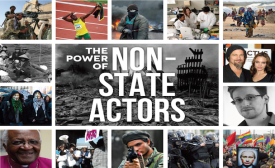non-state actors
In the months leading up to the first round of presidential elections April 5, and again now in the run-up to the runoff vote, tens of thousands of Afghans have been meeting up in schools, police stations, homes, public parks, women’s prisons, shelters and other communal spaces in villages throughout the country to watch and participate in these mobile theater performances. They're aimed at encouraging Afghans to believe in the power of their vote — in the first democratic transfer of power in Afghanistan after 30 years of war — and to stand up to the Taliban.
Everyone agrees an ISIS-controlled state could be deadly—but in what ways? We typically think of terrorist outfits like al-Qaida and ISIS as nonstate actors. But what does it mean when a nonstate actor carves itself a state? The disaster is worst for those unlucky enough to find themselves living under ISIS rule. The jihadist group’s extreme ideology calls for killing or subjugating not only Christians and Jews, but also many Muslims. Shiite Muslims, who make up a majority in Iraq, are particularly hated for their supposed apostasy, as are the Alawites who rule in Syria.
At the heart of Séverine Autesserre’s new book is a conundrum: If international peacebuilders are well-meaning people versed in the latest approaches to conflict resolution, why do their efforts so often come up short? Unsatisfied with the usual explanations (such as a lack of funding and resources from powerful states), Autesserre embarked on an ambitious project to interview hundreds of UN officials, NGO workers, and local staff in conflict zones around the world in order to study “the everyday” : their daily work routines, their standard security procedures, and even their social habits
The World Cup was meant to be a celebration of a new Brazil -- powerful, prosperous and jubilant. When the ball starts rolling in three days the world may instead view images of violence and inefficiency. Seven years after gaining rights to host sport’s most-watched event, Brazil nears the tournament amid street protests, economic slowdown and a wave of strikes including subway and museum workers.
Human trafficking and its connection to sports events have been discussed since the World Cup 2006 in Germany. Big and costly media campaigns warned of the rising problem of human trafficking of adult women in the sex industry. Since then, media and NGO campaigns became particularly visible before and around the World or European Cup, the Olympics and the Super Bowl. What can we learn from past experiences and research about this connection?
When Coca-Cola's marketers began plotting efforts around this summer's World Cup in Brazil, there was no question a musical anthem would be key to the effort. Four years ago, the company first experimented with the creation of a song tied to World Cup. The remix of K'Naan's "Wavin' Flag" served to weave together campaign elements and gave the marketer a way to tap into local markets. Twenty-four local versions of the song were created, with local artists singing in their respective languages.
South Korea and China will hold a joint public diplomacy forum in Beijing next week to discuss ways to step up bilateral exchange in non-political sectors, a foreign ministry official here said Thursday.

The latest issue of PD Magazine evaluates the power of non-state actors in globalization.







